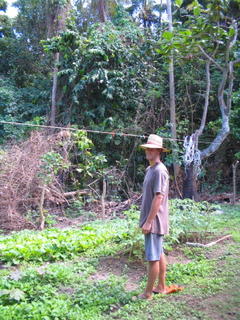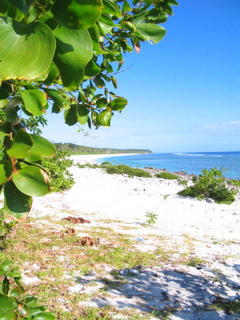These last few months have flown by, but it has been a truly wonderful eye-opening experience in our new home.
 OUR LITTLE ABODE!
OUR LITTLE ABODE!
Everyday we learn more about our hard working village, Lomanikaya. The women continue to beat the tapa cloth from the masi tree from dawn till dusk. The noise has dwindled down to a dull hum now instead of a hammering carpenter's convention like when we first arrived. The men of the village continue to play outside all day ~ fishing, gardening, and of course drinking the kava- bilo after bilo (coconut cup). They continue to give us food everyday, so much food! You would think we had six children the way they haul over bananas by the hundreds on the massive stalks. We also have our garden sprouting so rapidly we have about 50 Chinese cabbage ready to pick and eat. We love being apart of a community that shares everything.
DREW IN THE GARDEN/BACKYARD
Our biggest obstacle at the moment is the language barrier. The island dialect is completely different from the dialect the Peace Corps spent 2 months teaching us, so we are in a constant state of confusion. We usually just nod or give the Fijian equivalent, a double eye-brow raise, followed with an "Io, Vinaka." Which translates as "Yes, Thank you" or "Sure, Good". We never quite know what we're agreeing to, but so far we seem to be staying out of trouble. The island nurse has been tutoring us 2-3 times a week which has been helping- gradually.
HEALTH CENTER WOMEN/Liss's Co-Workers

Lately we've been helping with the village projects--
mostly fundraising events for our new church.
ROAD TO EKUBU AND HEALTH CENTER
We walk every single day
A few weeks ago Drew helped with a fish drive where all the men of 2 villages (almost 100 men) made a giant Fijian-style net out of palm leaves ( around 1000 meters long). They dropped boat fulls of men out at the reef and they swam in with the net scaring the fish towards shore. They gradually enclosed the fish wrapping the net in half circle next to the beach while the men held it secure ensuring no escapes.
THE FISH DRIVE

One by one the fish were speared and thrown onto the sand while the women gathered their share. They drove about 300 fish up ranging from 2-3 pounders to 30-40 pounders. They sold all the fish to one man who sells them on the mainland making $1500FJ. We took home 10 fish including a 15 pounder which we happily made tempura filets.
We also helped with their eco-tourism project when 13 toursist came for a day trip to the island. It is purely arranged by the village and begins when enough people sign up with a villager
working on mainland. They do no advertising, so people only hear about the opportunity by word of mouth. We were impressed to see the whole day in action and the mass effort behind it all.
LIKU BEACH
They arrive by our village boat about mid-morning to a small band playing traditional island music at the entrance of the palm tree lined project area decorated with tons of flowers. They are served fresh coconuts to drink and they relax in the bures ( traditional houses made of bamboo and palm). They have a sevusevu with the chief (formal kava session) and spend the most of the afternoon at the remote beach Liku. They return to a feast of roasted chicken, fish, fresh picked veggies and fruit, and traditional dancing and entertainment. We tried our best to hide when they arrived, hoping to blend and not look like vavalagi (foreigners), but as we were ducking in the trees the chief yelled "Peace Corp" and we had to graciously wave and help entertain.
When it was all over we felt more blessed than ever just thinking that we live amongst this beautiful culture and paradise island. Plus anyone who visits will get so much more than the average vavalagi vacation!
 LIKU BEACH SUNSET
LIKU BEACH SUNSET
Dad Styles, Dad Loganbill, and Brother Brandon Happy August Birthdays!
Prayers to the Garcia Family ~ We love you all.
 OUR LITTLE ABODE!
OUR LITTLE ABODE!
 OUR LITTLE ABODE!
OUR LITTLE ABODE!
 Lately we've been helping with the village projects--
mostly fundraising events for our new church.
Lately we've been helping with the village projects--
mostly fundraising events for our new church.




